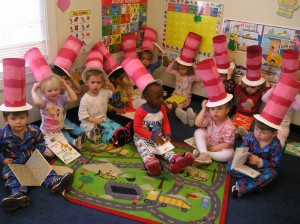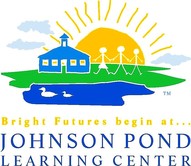Explorers
Language development is a primary focus at this level. You will hear teachers using terms such as; “Use your words”, “How does that make you feel?”, etc. Children are “given” words by the teacher to enable them to express their feelings and voice their concerns/frustrations (i.e., “I don’t like that!”).
Play becomes more social and interactive, and undesired behaviors, such as biting and hitting, are replaced with words and communication. Sharing toys and taking turns are skills learned at this level. Hand in hand, with the increase in social interaction, children also experience an increase in independence.
Potty training is a major part of this process. (We do not allow the use of pull-ups for potty training purposes. A potty training handout is available to all parents of potty training children.) Children learn to recognize when they need to go potty, how to manipulate their own clothing (pulling down pants, putting on shirts and jackets), how to clean their spills, how to put shoes on, proper table manners, etc.
We continue the development of gross motor skills and begin a heavier concentration on fine motor skills. Children will use scissors, crayons and markers, paint brushes, silverware, etc. on a daily basis. Letters and numbers will be a part of everyday conversation.
Theme units will be used to introduce academic concepts. At the two-year old level, the school provides lunch and snacks, rest cots, art supplies, and other consumables. Parents are responsible for cot sheets and blankets, changes of clothes, and diapers and diaper creams.
In most cases, children will advance with their peer group to the three-year old level at the beginning of the new school year. The ratio at the two-year old level is 1:9.
Play becomes more social and interactive, and undesired behaviors, such as biting and hitting, are replaced with words and communication. Sharing toys and taking turns are skills learned at this level. Hand in hand, with the increase in social interaction, children also experience an increase in independence.
Potty training is a major part of this process. (We do not allow the use of pull-ups for potty training purposes. A potty training handout is available to all parents of potty training children.) Children learn to recognize when they need to go potty, how to manipulate their own clothing (pulling down pants, putting on shirts and jackets), how to clean their spills, how to put shoes on, proper table manners, etc.
We continue the development of gross motor skills and begin a heavier concentration on fine motor skills. Children will use scissors, crayons and markers, paint brushes, silverware, etc. on a daily basis. Letters and numbers will be a part of everyday conversation.
Theme units will be used to introduce academic concepts. At the two-year old level, the school provides lunch and snacks, rest cots, art supplies, and other consumables. Parents are responsible for cot sheets and blankets, changes of clothes, and diapers and diaper creams.
In most cases, children will advance with their peer group to the three-year old level at the beginning of the new school year. The ratio at the two-year old level is 1:9.
|
| ||||||||||||
2023-2024 Rates (effective 8/22/23)

